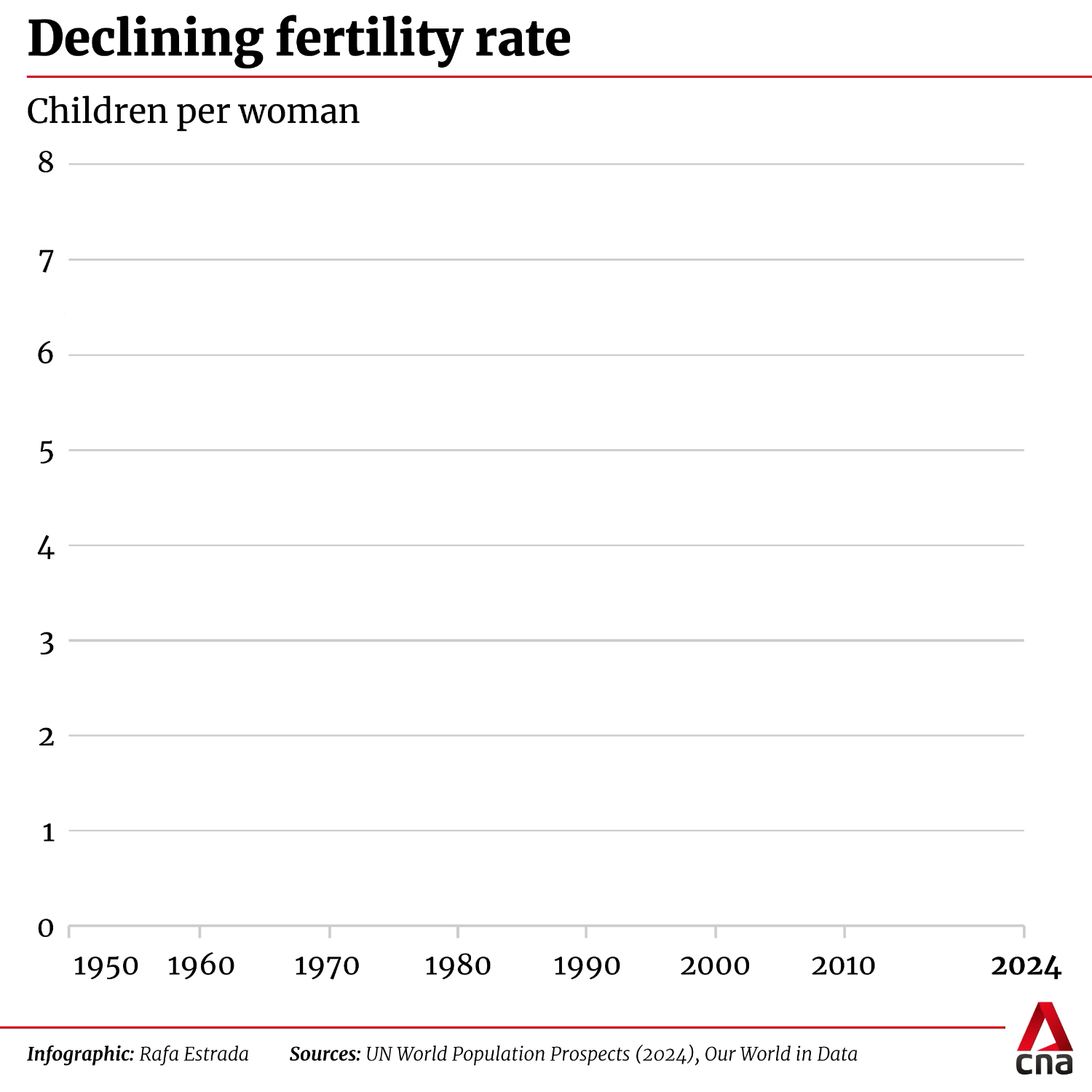'Every family has different challenges': Why China’s latest policies to raise birth rate could fall short
From picturesque marriage registration sites, financial rewards, to more unorthodox tactics. China unveiled new family planning policies but young Chinese say they have other priorities.

Hangzhou-based Ms Yu Yueqi (R), 32, and her husband Peter (L), 36, registered their marriage in March. The couple says they would like to enjoy a couple more years of their married life before considering having kids. (Photo: Yu Yueqi)

This audio is generated by an AI tool.
SINGAPORE: Having children was the last thing on Ms Yu Yueqi’s mind as she waited with her husband to board a 15-hour flight that would take them from their city of Hangzhou to the Maldives for their long-awaited honeymoon.
The 32-year-old newlywed admits that she hasn’t been paying close attention to ongoing policies about family planning and childcare in China.
For her, it was more about “feeling ready”, a pragmatic sentiment that is being increasingly echoed by more young couples and adults across the country who have been choosing to delay parenthood and marriage, or even having children altogether, in favour of reasons like financial stability or gender equality.
Such attitudes work against China’s latest efforts to boost marriage and birth rates - from creative measures like allowing couples to register their marriage in picturesque and so-called instagrammable spots instead of a drab government office, to practical ones like maternity insurance, expanded childcare and tax deductions.
There’s also more unorthodox tactics. Chinese women have shared bizarre accounts of receiving random calls from government grassroot workers, asking them about their plans for pregnancy.
The government has also launched a nation-wide survey, targeting some 30,000 people across 150 counties and 1,500 different communities, to understand and analyse attitudes towards childbearing and “reluctance and fear” tied to having children.
“I think having children is more about a couple's determination and patience in dealing with life’s daily challenges,” Ms Yu told CNA.
“We would like to enjoy a couple (more) years together being married before considering having children.”


PLUMMETING MARRIAGE AND BIRTH RATES
Births in China have been at their lowest and the country is also on track to record its lowest number of new marriages, according to official data released by the Ministry of Civil Affairs on Nov 1.
New births nearly halved from about 17 million in 2014 to just 9 million in 2023, according to China’s National Bureau of Statistics.
Marriage rates - closely linked to birth rates in China - are not promising either. Only 4.75 million couples got married in the past nine months, a 17 per cent decline from the same period in 2023.
Mr He Yafu, a Guangdong-based demographer, estimated that total marriage numbers this year could see a decrease of between six to seven million, down significantly from previous years.
China’s population, once the largest in the world, currently exceeds 1.4 billion but has been declining for two consecutive years, due to plummeting marriage and birth rates.
Adding to that is tremendous pressure on the younger generation to support an ageing population, with fewer people to look after the elderly as people live longer.
Experts say the shrinking population has resulted in a slowing economy, which has in turn discouraged people from getting married and having children.
“Labour is the backbone of the Chinese economy… (and) China's declining fertility rate has led to a shrinking labour force, ageing population and insufficient consumption (rates) which have led to a slowing economy,” said Dr Yi Fuxian, a demographer at the University of Wisconsin-Madison.
China’s patchy post-pandemic economic recovery, embattled property market, weak consumer confidence and high youth unemployment rates are not helping.
“Young people in China can’t even find jobs to support themselves, let alone get married and have children,” Dr Yi said, adding it was clear that current economic challenges, combined with the lasting legacy of the one-child policy which took effect in 1979, would make the task of raising the national birth rate a formidable one for the government.

In China, the average cost of raising a child until the age of 18 was estimated to be around 485,000 yuan (US$67,000) in 2019, nearly seven times the country's gross domestic product (GDP) per capita and much higher than elsewhere including the United States and Japan, according to Beijing-based think tank YuWa Population Research Institute.
Speaking to CNA about the challenges of raising her newborn daughter while working long hours at a bank in Yinchuan, the capital city of Ningxia region, 27-year-old Xiao Zhang said she was “not aware of any policies that could really solve these challenges”.
“They don’t have much practical impact on ordinary people. They feel very official and distant,” Ms Xiao said.
“With children, we have to consider housing, school districts, nearby facilities and mostly the financial burden. We can’t manage on our own,” she added.
“As a dual-income family, we can’t balance childcare without support from older family members. In rural areas, grandparents would even have to… adapt to life in the city, which is very difficult.”
“Work hours encroach on personal life and there’s no balance,” she said, adding that it was a priority to “make money first and then take care of the baby.
“That’s just the reality… Unless you’re working in the public sector, with a regular 9-to-5 schedule that allows for consistent childcare – most of us here are required to work overtime and only have one day off a week.
“Plus, companies have particular biases when hiring women, so changing jobs easily isn’t realistic.”
FALLING BIRTH RATES ALSO HAUNT THE REGION
But China is not alone in its demography struggles.
Neighbouring South Korea and Japan also see similar battles with fertility rates and fewer marriages, experts said, noting that government incentives like longer maternity leave and cash subsidies have not been reaping results.

Sociologist Sandy To noted the “issue” of more unmarried Korean and Japanese women “at childbearing ages” who were opting to stay single for longer.
“The later they get married in life, the lower chances of them having children because of biological constraints,” said Dr To, who also authored a book titled ‘China’s Leftover Women: Late Marriage among Professional Women and its Consequences’.
She believes that pro-birth policies in China would need to give women “more confidence that having children would not compromise their lifestyles and careers significantly”.
“Times have changed,” Dr To said.
“Young people can no longer be forced. They must be convinced that getting married and starting a family is good for their own wellbeing and be given confidence that they can have the adequate resources to do so.
“It boils down to there not being enough economic and social support for women to have children in modern societies.”
Ms Xiao recalled the pressures she faced at work while pregnant. “When I was pregnant, my supervisor subtly suggested I resign, and with such an environment, it’s already difficult to get pregnant, let alone raise a child.”
On the part of governments, Dr Stuart Gietel-Basten, a professor of social science and public policy at the Hong Kong University of Science and Technology, said policies and measures should reflect “a genuine support for family well-being” and not just a “means of increasing national birth rates”.
Declining births and fertility rates were also “a downstream reflection of other problems and challenges in society”, he said, adding that simply offering financial incentives will not address more systemic issues, such as high living costs, intense competition for educational success, and rigid work cultures.
“People don’t have children for the state,” said Dr Gietel-Basten, who has also served as a population policy consultant at the United Nations Population Fund.
“They don’t have children for (the sake of) the economy or to improve the dependency ratio or increase the total population.”
He added: “If it's about saying ‘we're worried about our total population size and about the rate of population ageing… so we need you to have more babies’ – that's not the best way to do it.”


In China’s case, experts warned that policies could ultimately face similar challenges seen in South Korea and Japan where economic incentives and social benefits have not been enough to reverse declining birth and fertility rates.
“What the Chinese government plans to do, the Japanese government has already done,” said Dr Yi. “China’s newly-introduced policies have been largely economic (in) trying to reduce the cost of childcare for families.”
“Japan’s approach has proved expensive and inefficient, only temporarily boosting fertility rates.”
Dr Gietel-Basten cited South Korea’s ongoing fertility struggles and warned against adopting a purely “pronatalist” approach, referring to policies designed with the purpose of increasing the birth rate.
“What has happened to the fertility rate in Korea? It just keeps going down and down and down,” he said, noting that, despite policy investments, the root issues often remain unaddressed.
“I think we have to listen to the concerns of young people and bring them into the decision making system.”
WHAT ELSE CAN CHINA DO?
In an official announcement released on Oct 19, China’s State Council unveiled a series of family planning policies which included more than a dozen measures such as maternity insurance, expanded childcare and tax deductions for families.
Some local governments have even gone further with targeted incentives. In the city of Luliang located in the western Shanxi province, financial rewards of up to 1,500-yuan would be awarded to newlywed couples registering their first marriage, if the bride is younger than 35.
Marriage registrations have also been simplified and even glamorised, with attractive venues and settings in picturesque parks, beaches and historic landmarks set aside for the occasion, to provide a better experience for lovebirds.
But despite these efforts and policies, many Chinese women still remain sceptical about switching life priorities.
Wanting to be known as Ms A, this working and married 29-year-old from Hangzhou has grown increasingly frustrated with societal expectations. “To me, marriage is simply marriage and it’s for love. It might not have anything to do with having children,” she told CNA.
“If I want to have kids, I will. If I don’t, I won’t. I don’t pay attention to policies, only to what I truly feel,” she said. “Just because I now have the legal right to bear children doesn’t mean that’s my purpose.”
“Can’t I wait until I genuinely want a baby before bringing one into this world, instead of reluctantly doing it because of social pressure?”
Working for a foreign company, she also highlighted shortfalls and inadequacies that many women in her city faced with the system. “Currently, maternity benefits aren’t even given directly to us (mothers), they go to the company,” Ms A said.
“In Zhejiang, we only get one payment: either the maternity benefit or six months’ salary—whichever is higher, paid by the company,” she said.
“Compared to our colleagues in Dalian and Shanghai, we end up receiving about 100,000 yuan less.”
Some, like Ms Xiao, are hoping for more practical support like extended maternity leave, which she believes could make a meaningful difference to raising her newborn daughter.
“A six-month-old baby still needs their mother and being forced to separate (from your child) is very painful,” she said.
“I hope for the implementation of a five-day workweek, eight-hour workdays, and protections for women’s maternity leave.”
Analysts say the Chinese authorities are aware of the gravity of their demographic issues, but as Dr Yi concludes, they are facing challenges in addressing multiple economic and social hurdles simultaneously.
“China's one-child policy has riddled the country with demographic problems. Like the barrel effect, China also has many short boards in raising the fertility rate, and only by making up all the short boards can the fertility rate be raised,” he said.
For others, starting a family still boils down to it being a deeply personal choice, shaped by complex factors that may not be fully addressed by policy changes alone.
“It’s hard to create policies that suit everyone since every family has different challenges. These policies indicate these issues are recognised, which is encouraging. (I would say), give the country some time to gradually improve them,” said Ms Yu.
Parenthood also involves two people, she adds.
“First, I would consider whether my partner has enough determination and patience – if he's ready to be a father and if he understands future risks,” she said.
“We will only think about having children after thoroughly discussing our future plans, so policies don’t play a big role in this decision,” said Ms Yu. “Whether we have kids or not, we’ll live well.”
















